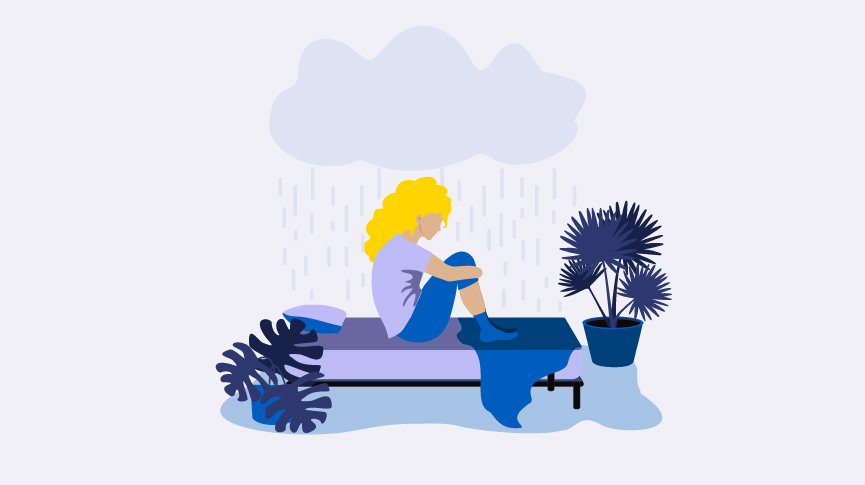Is Post-Sex Depression Normal?

Have you ever felt sad or depressed immediately after having sex? Even if the sex was enjoyable with a partner you love and respect – your mood suddenly shifts post-coitus. This may also happen after you orgasm from solo masturbation. Rest assured, you’re not alone.
What Is Postcoital Dysphoria?
Postcoital dysphoria (PCD), or postorgasm dysphoria, refers to feelings of depression and anxiety that spring up after sex without any specific cause.
While mental health professionals have only recently identified and labeled this condition, and a significant amount of research needs to be done before they are able to pin down exact reasons why it is so common for both males and females to experience unwanted emotions after sexual activity, there are some biological and environmental factors that have been correlated to the condition.
Psychological distress or past trauma may be part of the answer, but it must be emphasized that there are many people who experience postcoital dysphoria who don’t have any history of sexual trauma.
Postcoital Dysphoria Is Not Depression
Postcoital dysphoria refers specifically to unwanted emotions after having an orgasm, either from sex or masturbation. You may also know post-sex depression by colloquial terms such as post-orgasmic depression, post-nut syndrome, or post-sex blues.
Although the term “depression” is often used to describe these distressing feelings after sex, postcoital dysphoria is different than depression – clinical depression is defined as having depressive symptoms every day for a minimum of two weeks, while postcoital dysphoria only happens after you orgasm.
Of course, these conditions are not mutually exclusive, and you can be clinically depressed and also experience postcoital dysphoria.
Do I Have Postcoital Dysphoria?
Physicians and therapists can help diagnose postcoital dysphoria, but if you are experiencing significant distress, you don’t need to wait for a diagnosis to seek help. If you think you have PCD, take a peek at the diagnostic criteria listed below:
- Persistent disturbances in mood after sexual activity (alone or with a partner)
- Disturbances in mood that are not attributed to any other medical condition or mental disorder
- The mood disturbances significantly impair key occupational, social or other areas of function, or result in large amounts of distress
- After the onset of the disturbance – i.e after your first orgasm, and the feelings arise – there is an inability to enjoy sex
Along with the diagnostic criteria listed above, some common symptoms of postcoital depression include:
- Crying
- Depression
- Anxiety
- Aggression or irritation
- Guilt
- Regret
- Numbness
- Shame
- Emptiness
- Panic attacks
Is Post Sex Depression More Common in Men or Women?
While more common in women, both men and women experience post-coital dysphoria.
A common stereotype is that postcoital dysphoria is primarily a female problem. While postcoital dysphoria appears to express itself differently amongst the sexes, and is reported more often by women, it is common among both men and women. Research about this phenomenon is minimal, but medical professionals have drawn some general correlations.
A key 2015 study published in The Journal of Sexual Medicine noted that “There appears to be no relationship between PCD and intimacy in close relationships.”
A 2020 study found that women are more likely to experience feelings of sadness along with the mood shifts, while men are more likely to experience low energy with sadness. Women are more likely to experience postcoital dysphoria than men, with the percentage of women surveyed reporting symptoms ranging between 8% and 46%, and men aren’t too far behind with a 41% likelihood of experiencing symptoms of PCD at some point throughout their lives.
Post-Coital Dysphoria Causes
Again, further research is needed to learn more about the causes behind postcoital dysphoria, but there are a few potential reasons that researchers have come up with that could explain the onset of negative feelings following orgasm.
Hormonal Fluctuations
When you orgasm, your brain releases a surge of “pleasure” hormones like dopamine, as well as “calming” hormones like prolactin and oxytocin. However, since the oxytocin and prolactin (a dopamine inhibitor) are involved in curbing the wave of pleasure and inducing sexual satisfaction, it may result in sadness or a “crash.”
Past Sexual Trauma
Although PCD also occurs among people who haven’t suffered sexual trauma, it is possible that past sexual trauma may be a contributing factor. People with sexual trauma may have lingering feelings of discomfort or guilt that they subconsciously relate with sex. These feelings may arise even if they’re masturbating or having consensual sex with a trusted partner.
How To Deal with Post-Coital Dysphoria
While speaking with your partner and establishing healthy communication and aftercare rituals may be a good first step, if these feelings are causing you significant distress, you should seek help from a mental health professional.
If you’re experiencing postcoital dysphoria and have a history of sexual trauma, it is highly recommended to seek professional help, as sex could be triggering past traumatic events.
Sex can and should be a rewarding, pleasurable experience – whether it’s with yourself or with partners – and it’s important to be aware of your feelings, including PCD, in order to have the best possible experience.

Clara Wang is a freelance writer based in Nashville, TN but often found abroad. She mostly muses about the three best things in life: Food, sex, and music. Her work has been featured in publications such as Eater Austin, Eater Nashville, Giddy, Buzzfeed, Refinery29, the Austin Chronicle, the Austin American Statesman, and the Daily Dot.



Thank you for this great article.